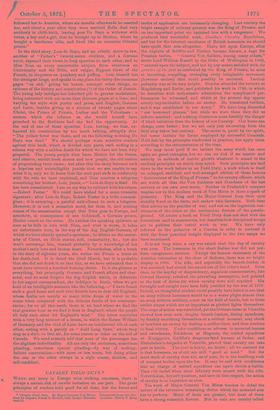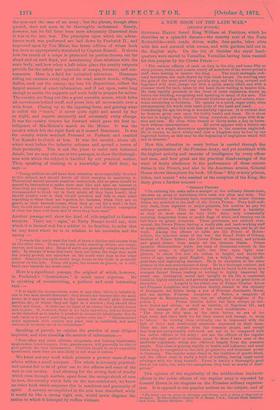CAVALRY FIELD DUTY.* WHEN any army in Europe wine striking
successes, there is always a certain risk of servile imitation on our part. The great principles of warfare hold good for all time, but the forms and
• Cavalry Field Duty. By Major-General Von Mims. Translated from the Ger- man by Captain Frank S. amen, 14th King's Hussars. London: Henry S. King and Co.
modes of application are incessantly changing. Last century the bright example of military potency was the King of Prussia, and on one important point we imitated him with a vengeance. We produced that wonderful work, Dundas's Cavalry Regulations, and but for the inherent excellence of British horsemen we should have spoilt that arm altogether. There fell upon Europe, after the exploits of Seidlitz and Ziethen became known, a rage for Prussian tactics. "General Von Saldern, among many others," wrote Lord William Russell to the Duke of Wellington in 1826, "entered upon the subject, and not by any means satisfied with the practice of the field as estalished by the King of Prussia, he aims at inventing, compiling, arranging every imaginable movement (however useless) that could possibly be executed. Tactical pedantry was at its very height. Dundee attended the reviews at Magdeburg and Berlin, and published his work in 1788, in which he describes with enthusiastic admiration the complicated per- formances he witnessed, and which at the present day appear utterly impracticable before an enemy. He translated Seldom, and it was established in our Army." We have long discarded "our borrowed plumes," but while we wore them they did us infinite mischief; and nothing illustrates more forcibly the danger of blind imitation than the history of our Cavalry. Our horse can charge, none better ; but we are only just recovering from the fatal step taken last century. The moral is, profit by the spirit, but never imitate the forma employed by successful Generals. Hold fast by the principles vindicated in practice, but apply them according to the circumstances of the time.
We may incur peril if we imitate the army which has once again set great examples, but we run no risk if we master and embody in methods of native growth whatever is sound in the cardinal principles on which they acted. Such principles are laid down in the work before us on Field Duty, a work which is itself an enlarged, enriched, and well-arranged edition of those famous "Instructions of the King of Prussia" to his cavalry officers, which are worth all that the Von Salderns and Dundases of the last century or our own ever wrote. Neither in Frederick's compact treatise nor in this modern work of Von Mirus is there a spark of pedantry. The King and the Major-General keep their eyes steadily fixed on the facts, and eschew vain fantasies. Both base their advice on the practice of war, and not on the ingenious con- trivances of the closet or the mechanical devices of the parade. ground. Of course a book on Field Duty does not deal with the formations used in manoeuvres, but describes how disciplined troops are to perform their varied work in war. We have only referred to the pedantry of a Dundee in order to contrast it with the freer practical insight displayed in the two essays we have mentioned.
It is not long since a cry was raised that the day of cavalry was over. The horsemen in the short Italian war did not per- form conspicuous services. Except the famous resistance of the Austrian cuirassiers at the close of Sadowa, there was no bright display in 1866. The rifle, and especially the breech-loader, it was assumed, had struck the sword out of the rider's hand. Even then, in the heyday of despondency, sagacious commentators, like Colonel Hawley, rebuked the prevailing assumption, and pointed to the host of duties for which cavalry were still required. His foresight and insight have been fully justified by the war of 1870. Indeed, no thoughtful student could possibly have failed to see that an army without horsemen would be in a worse plight almost than an army without artillery,—not on the field of battle, but in those earlier stages which are as important as pitched fights themselves. The scope of action was restricted, yet the German horse at Vionville showed how even now, despite breech-loaders, daring squadrons, by frankly sacrificing themselves at a critical moment, may check or bewilder an enemy by dealing a sudden blow, and thus conduce to final victory. Under conditions so adverse to mounted lancers and swordsmen, Edelsheim at Magenta, the mailed squadrons at Koniggratz, Gallifet's dragoons 'and hussars at Sedan, and Rheinbaben's brigades at Vionville, proved that cavalry can take part in battle. The cost is heavy, no doubt ; all we contend for is that horsemen, as of old, are still "good at need." But the main work of cavalry does not, as of yore, lie in the headlong rush of compact bodies upon the foe. It may be said with confidence that no charge of serried squadrons can again decide a battle. That role ended when stout infantry were armed with the rifle. Nevertheless, beyond question, and save in this respect, the action of cavalry is as important as ever.
The work of Major-General Von Mirus teaches in detail the nature of the extensive remaining duties which the mounted arm has to perform. Many of them are prosaic, but most of them have a strong romantic flavour. Not in vain are cavalry called
the eyes and the ears of an army ; but the phrase, though often quoted, does not seem to be thoroughly understood. Rarely, however, has its full force been more adequately illustrated than it was in the late war. The principles upon which the adven- turous work was performed are laid down by Frederick II., and improved upon by Von Mirus, the latest edition of whose book has been so appropriately translated by Captain Russell. It shows show the march of a corps is protected by parties thrown out far ahead and on each flank, yet maintaining close relations with the main body, and how when a halt takes place the cavalry outposts provide for the safety and quietude of camps, bivouacs, and can- tonments. Here is a field for unlimited adventure. Horsemen riding out examine every step of the road, search woods, villages, defiles, seek out the enemy, spy into his dispositions, collect the largest amount of exact information, and if set upon, resist long enough to enable the supports and main body to prepare for action. The cavalry are flung out like a great movable screen, which hides all movements behind itself, and peers into all movements over a wide front. Closing up to the 'opposing force, and gaining what is called the "touch," it never quits sight and sound by day or night, and reports succinctly and accurately every change. It was the cavalry thrown far forward which gave the first in- telligence of MacMahon's march on the Meuse. It was the cavalry which felt the right flank as it neared Beaumont. It was the cavalry which watched Frossard at Forbach and enabled Von Kameke to clutch at him. It was the cavalry, above all, which went before the infantry columns and spread a terror of their proximity. This is not the place to enter into technical details, but we may cite one or two passages, to show the thorough- ness with which the subject is handled by our practical author.
Thus, speaking of training in a knowledge of field duty, he says :— " Young soldiers should have their attention more especially directed to this subject, and should devote all their energies to mastering it. Theoretical should precede practical instruction, and no pains should be spared by instructors to make their men like and take an interest in what they are taught. Those, however, who wish to learn are especially recommended to think out in their minds all they have heard ; they should ponder over it, they should question and talk to each other regarding it when they are together, for instance, when they are on guard, in their barrack-rooms, when they go out for a walk ; in fact, they should never rest until they have a clear and distinct conception of what has been told them and of what they have read."
Another passage will show the kind of aids supplied to German troopers. There are "signs," as Natty Bumpo would say, with which it is deemed well for a soldier to be familiar, in order that he may know where he is in relation to his comrades and the enemy :—
" Towards the north-west the bark of trees is thicker and coarser than on the other sides. Trees. old posts, rocks, standing stones, are rough, uneven, and mossy also. Heaps of earth are generally overgrown on this aide. In stamps of trees that have been cut down, the rings that mark the yearly growth are narrower on the north-west than on the other sides. Similarly the earth under large stones in the fields is generally moister on this side. Trees, old posts, the crosses on graves, as a rule, bend over towards the south-west."
Here is a significant passage, the original of which, however, in Frederick's "Instructions" is much more vigorous. He is speaking of reconnoitring, a perilous and most interesting task :—
" If at night the reconnoitrers come to any place which is inhabited, one or two men should dismount; they should not venture into the main street, as it may be occupied by the enemy, but should glide through gardens, itc., to where they see light in a window ; they should then watch and listen. If there are no signs of an enemy they should knock and inquire. If, however, there is no light anywhere, and no house is so far detached as to render it prudent to arouse its inhabitants, then the only course is to match until they can capture some one." " Reeonnoitrere must approach with caution any place that is inhabited, and must endeavour to catch one of its inhabitants."
Speaking of patrols, he enjoins the practice of most diligent inquiries, and thus classifiea the sources of information :—
"Post-office and other officials, clergymen, and leading inhabitants, magistrates, hotel-keepers, Jews, gamekeepers, will generally be able to give patrols the best information. Children should be more especially questioned, since they are less likely to tell what is untrue."
We know not any work which presents a greater mass of sage advice within a small compass. The whole is intensely practical, and cannot fail to be of great use to the officers and some of the men in our cavalry. And allowing for the strong dash of cruelty which runs through warfare, apart from the savage shock of man to man, the severity which falls on the non-combatant, we know no other book which surpasses this in manliness and generosity of spirit. A cavalry accomplished in the arts here described, while it would be like a strong right arm, would never disgrace the nation to which it belonged by ruffian violence.



































 Previous page
Previous page